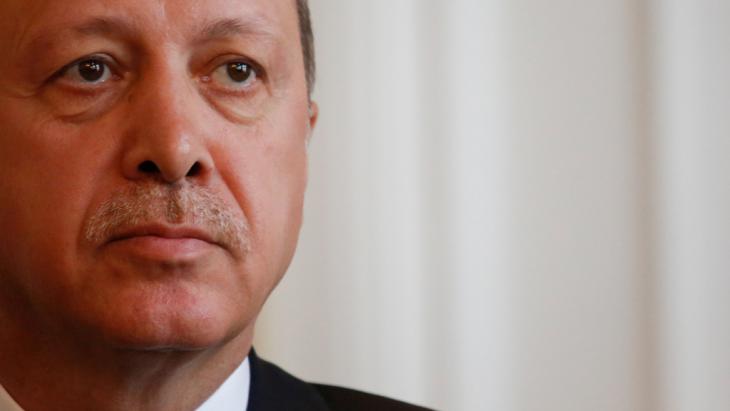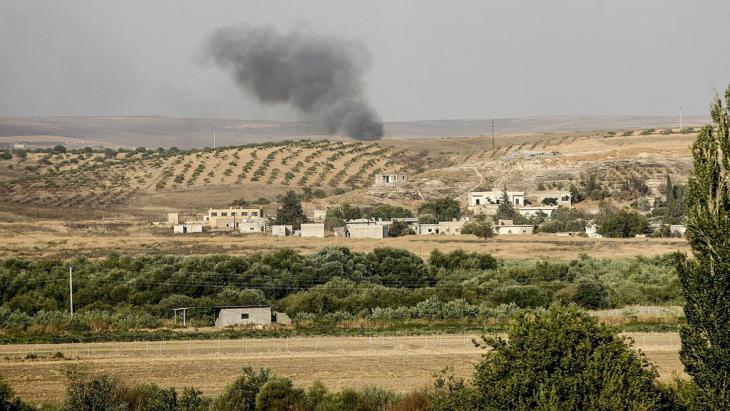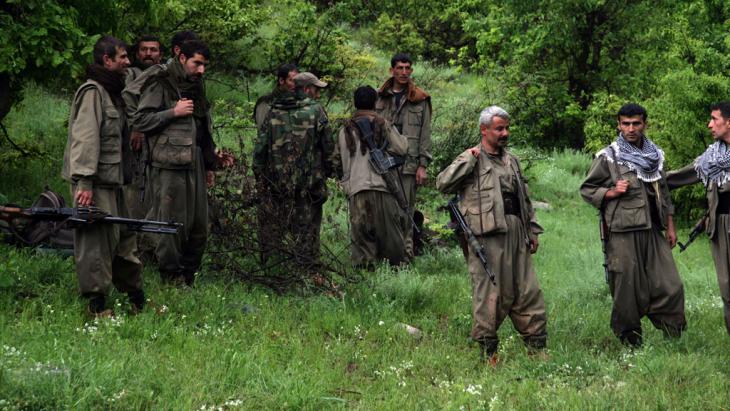Erdogan's double strategy

For years, the Turkish government has held back from attacking the self-styled Islamic State movement (IS). But since 24 July, Turkish fighter jets have been bombing IS positions in Syria. In addition, Ankara has allowed the US to launch air attacks from the strategically placed base at Incirlik.
In parallel to this, the Turkish army has begun bombing Kurdistan Workers' Party (PKK) positions in Turkey and northern Iraq. On Tuesday, 28 July, President Erdogan announced that the peace process with the PKK, classified as a terrorist organisation by the US and EU, was over. "It is not possible for us to continue the peace process with those who threaten our national unity and brotherhood," he said.
Threat from the pro-Kurdish HDP
"Erdogan is no longer interested in a political solution to the conflict with Damascus and the PKK," says Ismet Akca, a political scientist and military expert at Istanbul's Yildiz Technical University. His reasoning: only with the unrest that is to be expected in Turkey, can Erdogan consolidate his influence and keep the pro-Kurdish People's Democratic Party (HDP), which has in recent months emerged as a real threat to his rule, at bay.
The HDP garnered a surprising number of votes in parliamentary elections last June, a result that contributed to the fact that Erdogan's conservative Islamic AKP party lost its absolute majority. After 12 years, the AKP must for the first time court a coalition partner. It has not been successful so far, and new elections are an increasingly likely prospect. And therefore, says political scientist Akca, a war on two fronts against IS and the PKK is advantageous for Erdogan.
"Erdogan is now focusing on a strategy that is nationalist and military in nature. He aims to show the Turkish people that without a stable AKP government, terrorism will return to Turkey," says Akca. The head of state is provoking the PKK in the hope that it will hit back. Any retaliatory attacks could damage the reputation of the HDP, says Akca, because the party does indeed maintain close ties with the PKK.
On 28 July, Erdogan called for the parliamentary immunity of HDP leader Selahattin Demirtas and other leading party functionaries to be lifted. "Anyone with links to terrorist organisations must pay the price for this," said Erdogan.

Temporary rapprochement with Assad
In advance of all this, it had for a long time appeared as though there could be a rapprochement between the Turkish government and the PKK. A number of reforms were introduced for the benefit of the Kurds during Erdogan's time as prime minister. Negotiations were begun with PKK leader Abdullah Ocalan and after a diplomatic freeze lasting decades, Ankara and Damascus began talking again.
In fact, Erdogan and Assad got along so well at the time that the Turk referred to the Syrian as a "brother". The families of the two politicians even spent a few days together on holiday in the Turkish seaside resort of Bodrum. Visa requirements between the two nations were lifted; the cabinets held joint meetings.
When in March 2011 Syrians thronged the streets in peaceful protest against the Baath dictatorship, Erdogan initially tried to persuade Assad to implement reforms. The latter did indeed make pledges that Erdogan publicly praised – only to find that Assad didn't keep those promises. Ankara has been among Assad's most vociferous opponents ever since. In return, Damascus now accuses Erdogan of supporting terrorists.
Amidst the confusion of war, an autonomous Kurdish region took shape in the north of Syria, named "Rojava" (West) by the Kurds. This is a region that extends almost 600 kilometres along the Syrian–Turkish border in the border zone between Syria, Iraq and Turkey. Erdogan, who appears to be more fearful of Kurdish efforts to achieve independence than the IS jihadists, made it clear that he would never tolerate a Kurdish state.

Bolstering the extremists?
When IS overran the Kurdish city of Kobani on the Turkish–Syrian border last autumn, Ankara did nothing to stop the extremists' actions. The AKP government's "open border policy" was blamed for helping to bolster IS and weaken the Kurds. Erdogan was also accused of ignoring the danger presented by IS, in the hope of an imminent end to the Assad regime.
Anyone making any public assertion to this effect drew Erdogan's ire. When the US daily "New York Times" suggested in September 2014 that the AKP was supporting IS, the Turkish President angrily dismissed the claims as lies.
After the Turkish daily "Cumhuriyet" – a publication that has long been critical of the government – published a video in late May purporting to show an arms shipment from the Turkish intelligence agency to IS jihadists in Syria in early 2014, public prosecutors launched a criminal investigation into the paper's editor-in-chief Can Dundar. As Dundar informed his followers on Twitter, the charges of espionage and spreading terrorist propaganda were filed by none other than Erdogan himself.
But Erdogan's tactic of sitting back, looking away and locking away has ceased to be effective since the attack on the Turkish city of Suruc, which left 32 dead. As well as the threat presented by IS, the group thought to be responsible for the attack, and the fear of the Kurds, the sobering result of the parliamentary poll has caught up with the president.
The fact that NATO assured Turkey of its full political support on 28 July and that NATO Secretary General Jens Stoltenberg spoke of "strong solidarity" with Turkey without any criticism of the revocation of the peace process with the PKK, has further consolidated Erdogan's position. The president has already announced that Turkey will continue its military operations against IS and the PKK "with determination", adding that a "step back" is out of the question.
Cigdem Akyol
© Qantara.de 2015
Translated from the German by Nina Coon
